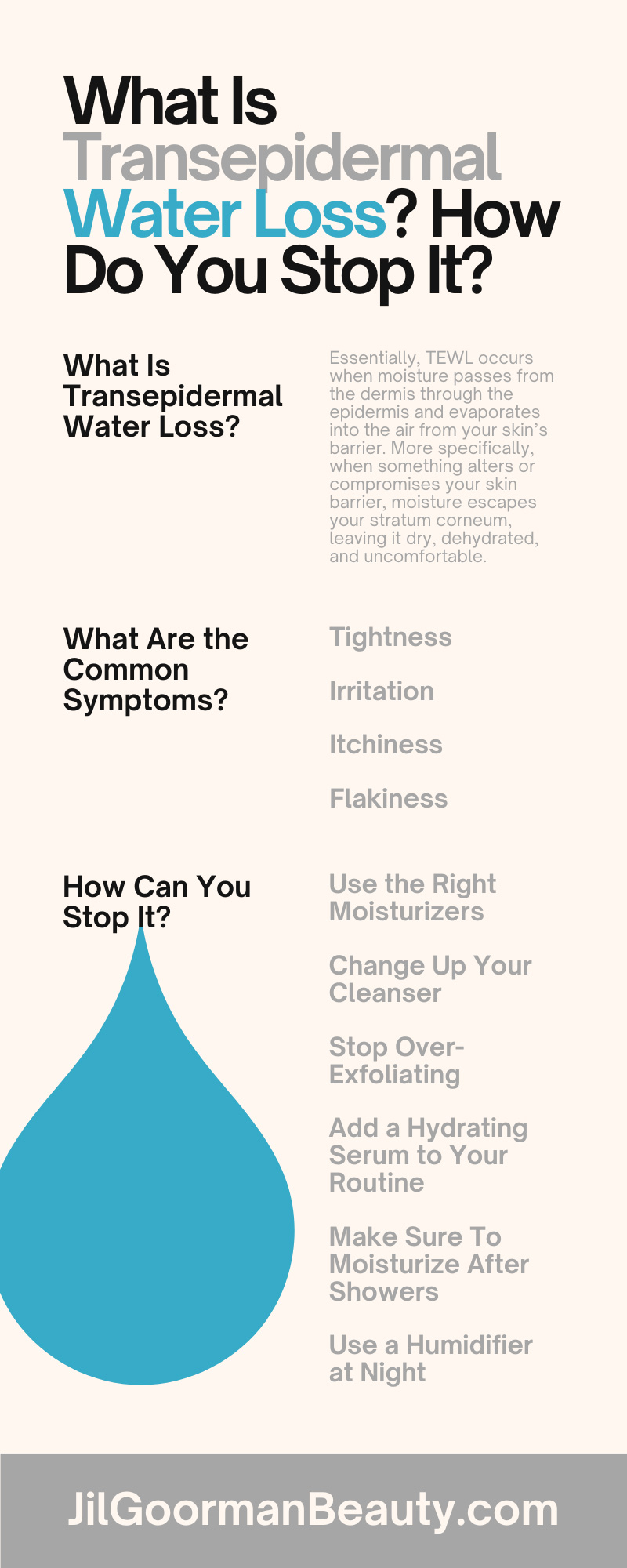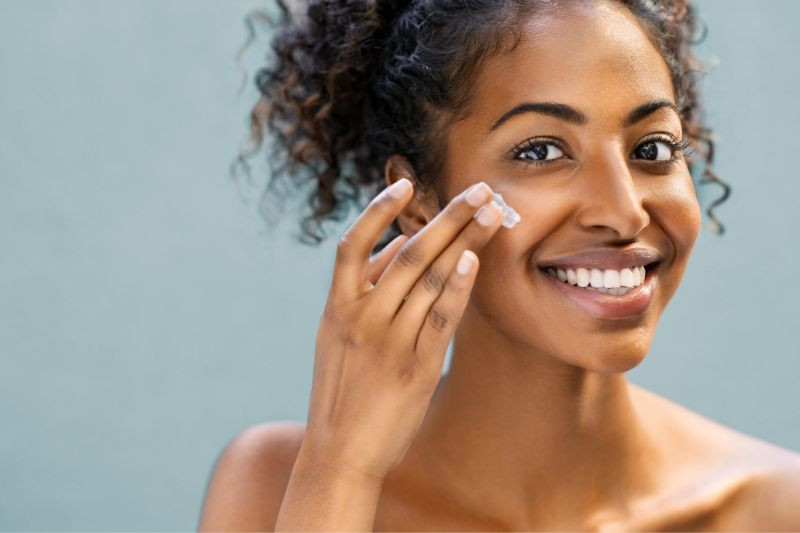Having ultra-dry, irritated, red, or flaky skin can be frustrating. Unfortunately, countless people suffer from this issue but have no idea what causes it or how to correct it. If you suffer from excessively dry or flaky skin, transepidermal water loss (TEWL) may be the leading cause of the issue. Follow along to learn what transepidermal water loss is and how to stop it.
What Is Transepidermal Water Loss?
Despite the complicated name, TEWL is relatively simple. However, you must understand your skin’s layers in order to comprehend what actually happens during this process.
Your skin consists of three primary layers: the hypodermis (innermost layer), the dermis (middle layer), and the epidermis (outermost layer). And even though the epidermis is the outermost layer of the skin, it also consists of its own five layers. The true outer layer—which is also the skin barrier—is the stratum corneum.
Essentially, TEWL occurs when moisture passes from the dermis through the epidermis and evaporates into the air from your skin’s barrier. More specifically, when something alters or compromises your skin barrier, moisture escapes your stratum corneum, leaving it dry, dehydrated, and uncomfortable.
What Are the Common Symptoms?
Your body is usually smart enough to regulate water retention and loss on its own. However, there could be extenuating circumstances that make TEWL more severe.
If you’re unsure whether or not you’re suffering from excessive transepidermal water loss, you should know what to look out for. Follow along to learn more about each of the potential signs and symptoms associated with transepidermal water loss.
Tightness
Dehydrated skin cells move closer together, which causes them to pull tighter across the surface. As a result, you may experience a tight, unpleasant feeling in your skin. This symptom on its own doesn’t automatically mean you’re experiencing excessive TEWL, but it’s a potential indicator.
Irritation
Because water loss is a result of a damaged skin barrier, your skin may feel irritated and uncomfortable. This is potentially the most noticeable symptom of TEWL, as you may not be able to get through your day without thinking about the discomfort.
Itchiness
Intense moisture loss can result in dry, cracked skin, which inevitably comes with an itchy feeling. This also may be difficult to ignore, as itchiness can disrupt your normal everyday life.
Flakiness
Because moisture is leaving your skin from the inside out, your outermost layer of skin is usually the first layer to dry out. If it dries out entirely, its skin cells die and peel away from your body in flakes. Flakiness is unpleasant to go through, as it is a commonly undesirable look and may exposure a new layer of skin to the elements before it’s ready.
How Can You Stop It?
One of the most important habits to form when trying to reduce TEWL is maintaining a healthy skin barrier. An unhealthy, compromised barrier doesn’t do a good job of maintaining good skin health. On the other hand, when your barrier is functioning properly, it blocks environmental pollution and irritants from entering your body and helps retain moisture.
Even if your skin barrier is not currently protecting against TEWL, you can do a few things to improve your skin’s health and barrier. Consider adding a few of these practices to your daily skincare routine for the best possible results.
Use the Right Moisturizers
In order to maintain healthy skin, you must use a moisturizer. In fact, your moisturizer is arguably the most important step in your skincare routine.
With that said, there are a few different types of moisturizing products to keep in your arsenal. Of course, if you wear makeup, you need a lightweight moisturizer to wear underneath your makeup during the day.
And because your skin enters recovery mode while you sleep, you should have a heavier cream that you apply before bedtime to lock in hydration throughout the night. This is especially important during the winter months, when the cold air encourages dryness and other common skin problems that proper hydration fights.
Change Up Your Cleanser
Believe it or not, many cleansers contain harsh chemicals. Although they’re effective at removing the dirt, oil, and makeup from your face, they also strip your skin’s natural oils, which can damage your moisture barrier.
With that said, you should consider switching to a gentle cleanser that supplies hydration rather than removing it. Furthermore, you should avoid washing your face more than twice each day, as that can cause excessive dryness.
Stop Over-Exfoliating
Similar to over-cleansing, over-exfoliating can cause extensive damage to your skin. Although you may need to help your skin shed dead cells, you should stick to exfoliating just twice each week for the best results. Otherwise, you may experience discomfort.
Add a Hydrating Serum to Your Routine
If you need extra moisture, consider adding a hydrating serum to the middle of your existing routine. For instance, if you use a cleanser, toner, and moisturizer, you should use the serum between your toner and moisturizer for the best possible results. A serum will absorb into your skin first, and a hydrating moisturizer will lock it in.
Make Sure To Moisturize After Showers
Hot showers are relaxing and usually preferred to cold ones; however, the hot water can be damaging to your skin’s barrier. Nevertheless, you don’t have to sacrifice your hot showers to help your skin. If you cleanse in the shower, you should do your best to moisturize immediately after drying off. Because your pores are still open shortly after exposure to warm water, applying your moisturizer as soon as possible is the best way to lock in hydration.
Use a Humidifier at Night
Your home’s humidity levels may be low, especially during the winter. As a result, you may experience extra-dry skin. However, you can maintain ideal humidity levels for your skin by using a humidifier at night in your bedroom. This will keep your skin happy, healthy, and able to fight against transepidermal water loss.
Now that you know what transepidermal water loss is and how to stop it, you can maintain painless, beautiful, glowing skin. Follow the advice above and use quality skincare products to achieve the skin you want. At Jil Goorman Beauty, we carry acne-safe skincare that will care for your skin and supply it with the moisture needed to reduce transepidermal water loss. Browse our selection of skincare products today!


